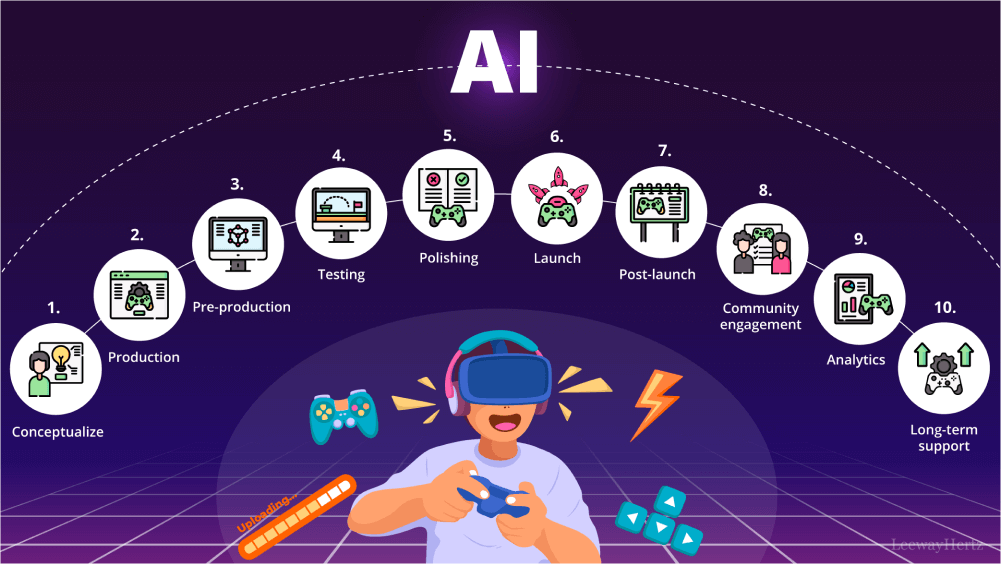Introduction
Artificial Intelligence is transforming the gaming world, making games smarter, more immersive, and far more interactive than ever before. From lifelike non-player characters (NPCs) to procedurally generated worlds, AI is pushing the boundaries of what’s possible in video games. By 2025, AI will no longer be just a background tool—it’s becoming central to how games are designed, played, and experienced.
The impact of AI in gaming extends beyond graphics or faster processing. AI shapes gameplay dynamics, personalizes challenges, and helps developers create engaging, reactive worlds. Players can expect adaptive storylines, smarter opponents, and virtual environments that respond in real time to their actions.
In this article, we’ll explore the key AI innovations transforming gaming, from smarter NPCs and procedural content to AI-driven graphics, VR enhancements, and development tools. We’ll also highlight future trends, such as generative AI, cross-platform adaptation, and ethical considerations, helping gamers and developers prepare for the next generation of immersive, intelligent gameplay.
AI-Powered Game Design
Procedural Content Generation
AI enables procedural content generation, allowing games to automatically create unique worlds, levels, and maps. This enhances replayability and variety, as seen in games like No Man’s Sky, which generates millions of unique planets for each playthrough.
Dynamic Storytelling
AI is revolutionizing narrative design. Games can adapt storylines based on player choices, actions, and play style, creating personalized experiences where every decision matters. This boosts engagement and emotional investment in the game world.
Personalized Gameplay
AI analyzes player skill, preferences, and behavior to dynamically adjust difficulty. Racing games can adapt opponent behavior, and strategy games can provide evolving challenges, ensuring an immersive experience without frustration.
Smarter NPCs and Opponents
Enhanced NPC Behavior
AI-powered NPCs now react naturally to player actions and environmental changes. Rather than following rigid scripts, they make decisions, strategize, and interact realistically, enhancing immersion.
AI Opponent Learning
Opponents can learn from players, analyzing tactics and adjusting strategies dynamically. For example, guards in stealth games can adapt to repeated player approaches, making gameplay unpredictable and challenging.
Multiplayer AI Integration
AI enhances multiplayer experiences by filling team roles or maintaining challenge levels. AI teammates assist players, while AI opponents ensure balanced competition in single-player and multiplayer modes.
AI in Graphics and Immersion
Graphics Enhancement
AI improves textures, lighting, and rendering in real time, delivering stunning visuals without overburdening hardware.
Virtual Reality & AI
In VR, AI creates smarter interactions, enabling NPCs and objects to respond naturally to player actions, resulting in highly immersive simulations.
Audio & Sound Design
AI transforms soundscapes, generating adaptive music, environmental sounds, and dynamic effects that react to gameplay, adding depth to the player’s experience.
AI-Driven Game Testing and Development
Automated Bug Detection
AI can detect bugs and glitches automatically, speeding up quality assurance and reducing development time by identifying issues human testers may overlook.
Player Behavior Analysis
AI tracks player interactions to inform design improvements, balance gameplay, and enhance engagement. Insights from behavior patterns allow developers to optimize experiences.
Game Balance Optimization
AI adjusts mechanics like enemy strength, resource distribution, and level progression based on player performance, ensuring fairness and challenge throughout the game.
Future Trends and Innovations
Generative AI in Game Creation
Generative AI enables rapid creation of levels, characters, storylines, and art assets. Players and developers can co-create worlds, blurring the line between gamer and creator while reducing production costs.
Cross-Platform AI Adaptation
AI ensures consistent experiences across consoles, PCs, and mobile devices, allowing seamless gameplay and adaptive challenges regardless of platform.
Ethical AI in Gaming
Ethics are critical as AI evolves. Developers must prevent cheating, ensure fairness, and protect player data. AI should enhance gameplay, not exploit users, maintaining transparency and accountability.
Conclusion
AI in gaming 2025 is reshaping the industry, making games smarter, more immersive, and increasingly adaptive. Innovations like procedural content generation, dynamic storytelling, smarter NPCs, AI-driven graphics, and VR enhancements promise personalized experiences that react in real time.
AI also streamlines development, testing, and player analytics, freeing creators to focus on creativity while AI handles repetitive, data-intensive tasks. Future trends—generative AI, cross-platform adaptation, and ethical AI practices—will continue to redefine gaming.
For gamers and developers alike, embracing AI means more intelligent, interactive, and engaging experiences. The future of gaming isn’t just about graphics—it’s about AI creating worlds that evolve, challenge, and respond to players like never before.
